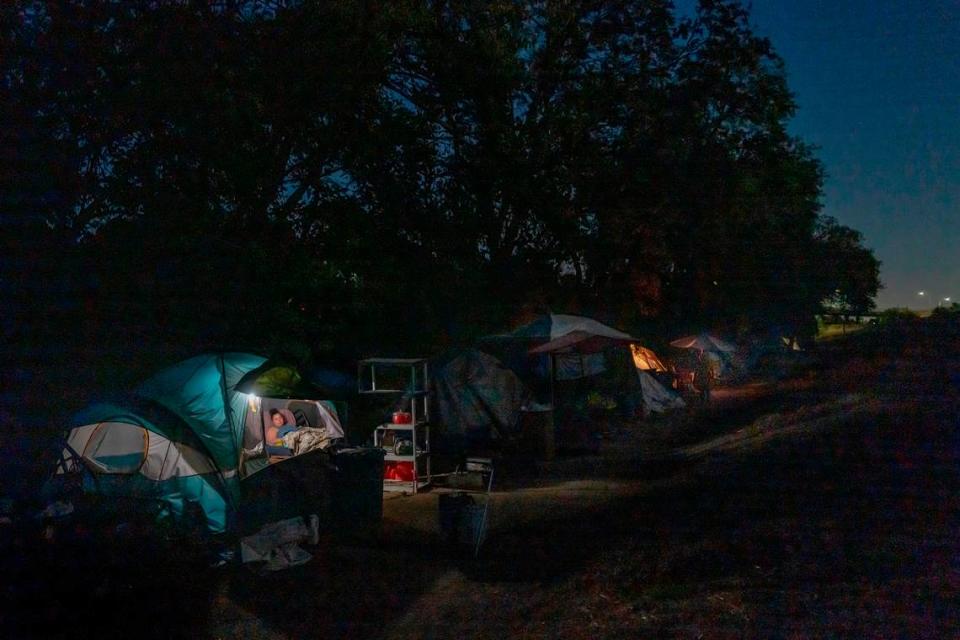‘A family we created’: How homeless women of Camp Resolution built a Sacramento community | Opinion
Holly Porter will believe that she’s getting a home, with a door that locks and a roof that doesn’t touch her nose every time it rains and blows, when the key is in her hand.
In the nearly 2 ½ years she’s lived in a tent in Sacramento while almost completely unable to move, after the sepsis during childbirth that took her unborn son and so much more, her attitude of expecting the worst while hoping for at least a little something better has yet to be proven too pessimistic.
Two days after I wrote about Holly the last time, in January, she received visits and promises from representatives of the city and the county, nonprofits and adult protective services. But housing for the disabled is nearly nonexistent, so even their desire to avoid more unwelcome news coverage didn’t keep her from spending another harsh winter outside in her hospital bed in one of the richest states in the richest country in the world.
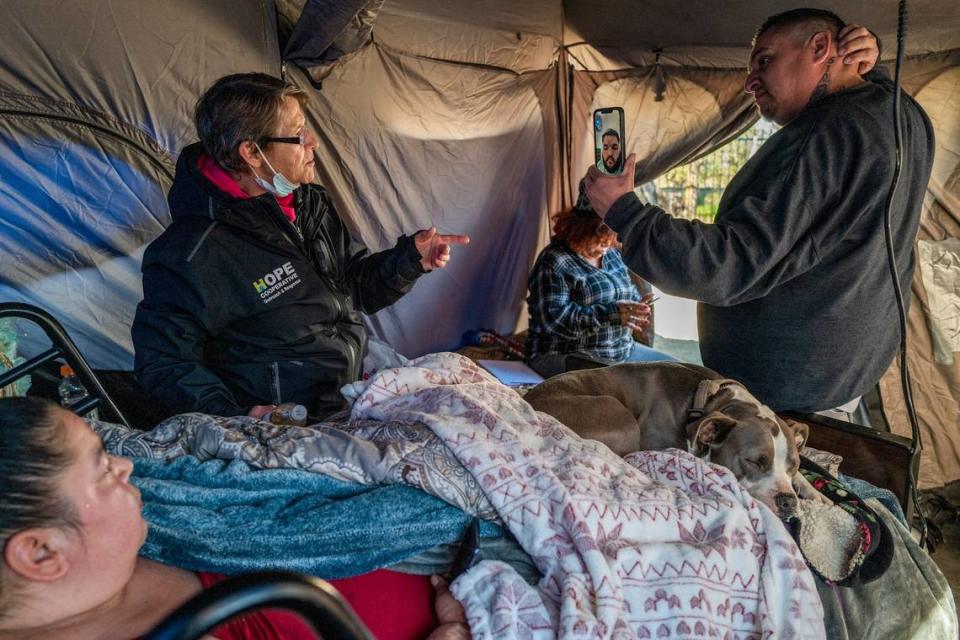
Now, finally, there is reason to hope that Holly’s key-in-hand moment is not far away. But as she continues to wait, through storms that even some of us who do have homes find disquieting, I want to tell you about the way her friends at Camp Resolution — the self-governing matriarchy of an encampment at Arden Way and Colfax Street in North Sacramento — have mobilized for her, because it’s a real love story.
Last Friday, a property management representative working with a site where she hopes to be placed through Sacramento Steps Forward met with Holly and her mother to go over their application for a rent-reduced two-bedroom apartment.
Opinion
The guy couldn’t have been kinder. Only, nothing is ever simple when you can’t move, so Holly had to be raised out of bed with a hydraulic Hoyer lift, used to help people with mobility problems, for the meeting. That process took almost an hour, and then she was left hanging up in the air, literally, for another hour while she waited to meet him, because he’s not supposed to go into a tent or encampment.
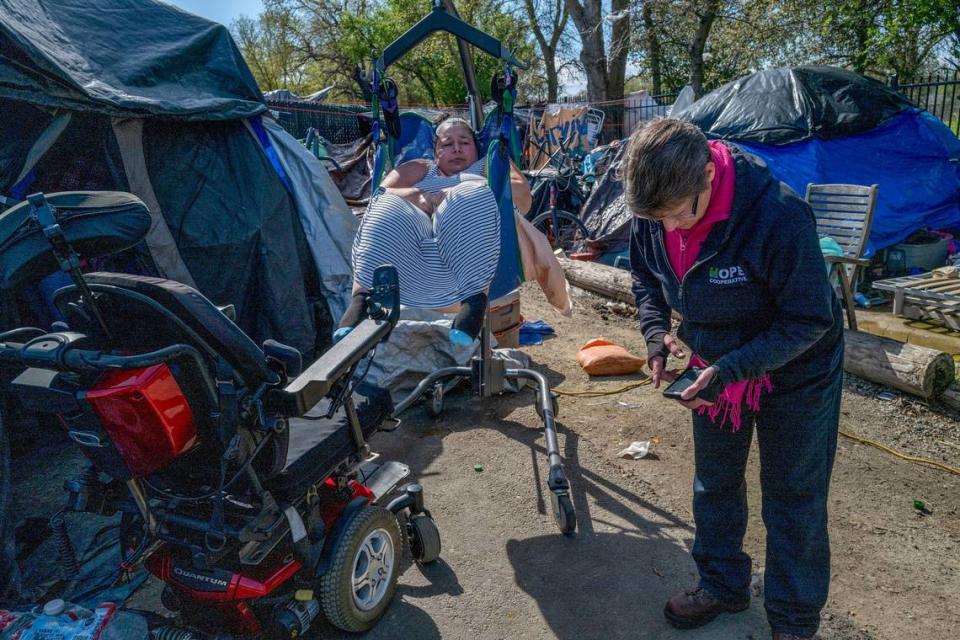
Even while left hanging, she hung in there
She was also left dangling there since she couldn’t fit into the spiffed-up used motorized wheelchair that Loaves & Fishes had just given to her; the chair’s extra-wide armrest made sliding her in impossible, and Googling gave no good answer about how to adjust it.
Then, the lift started listing with her in it, and her mother and brother, in keeping with the history of mothers and brothers, yipped at each other under the stress of trying not to let Holly fall.
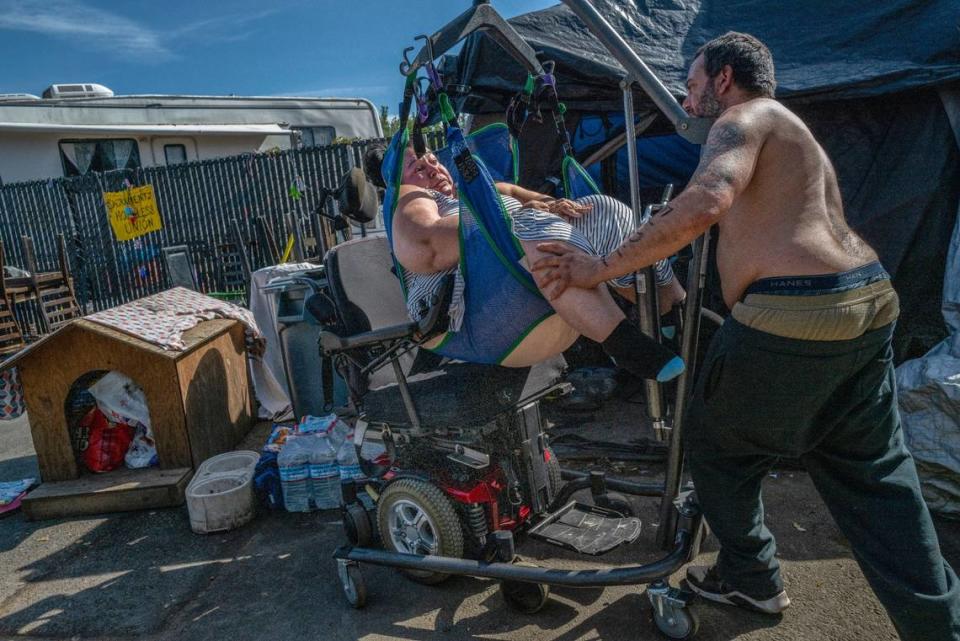
She normally relies on her electric bed to keep her from staying in one position for an uncomfortably long time, and being stuck up in the lift like that threw her back into a painful spasm. Yet even as she was hanging on a string, she also hung in there, maintaining her dignity and outward calm in a hideous situation.
And just as impressive as her grit was the way others in the encampment stayed in constant motion on her behalf, changing her sheets, sweeping the area around her tent, and calling out encouragement. “Holly, you rock!” yelled Joyce Williams, one of the leaders of Camp Resolution.
Holly is the reason that Camp Resolution exists, Joyce told me, since it was Joyce’s worry about getting her off of the river before the rains came that gave her the idea that they should just go ahead and occupy the fenced-in, city-owned site, which is on high ground, and which at one point was supposed to be used for tiny homes for homeless folks.
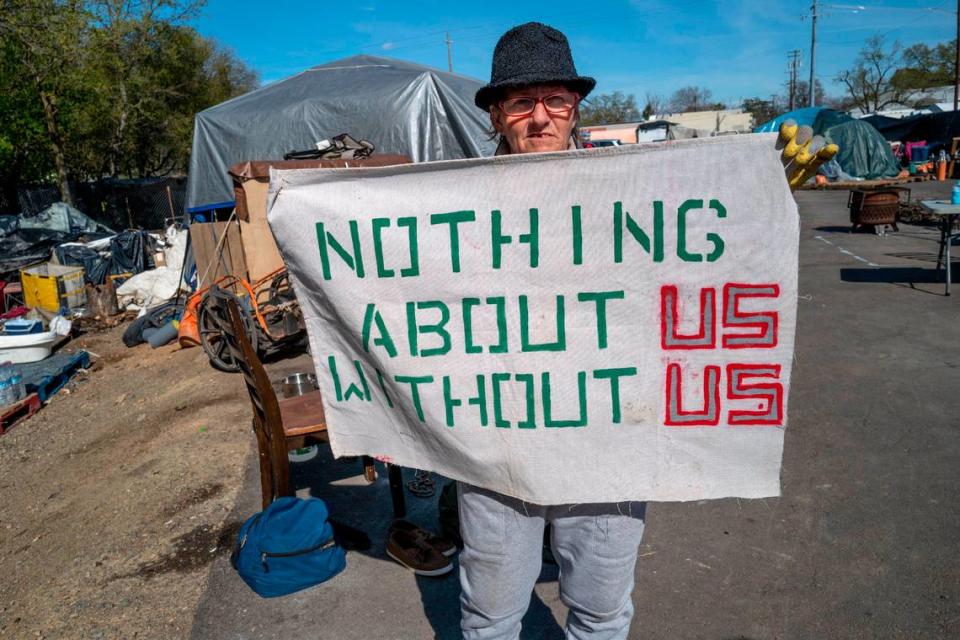
After some city officials opposed that plan, it was going to be a safe parking site, with half of the area paved and half used for showers and other amenities. Last April, the 106 people who had been living on the property were pushed out by the city and were told they could come back in a couple of weeks, after the site had been paved.
But then, after spending $617,000 to fence the site and pave just half of it, the city locked and abandoned the place and the people, saying oops, it would not help enough of them to justify spending any more money to pave toxic ground, so never mind.
In October, Joyce saw that Holly’s mother was getting more and more anxious about where they’d go when they had to move off the river for the winter. “This lot was just sitting here,” Joyce said, so in they came, “to make sure that she was safe for the winter.” Or safer, anyway, than down on the parkway. Here, even through the storms, “her tent hasn’t fallen, and she hasn’t had to stress about that, which is all that matters.”
‘We saved 50 lives this winter’
Joyce, her wife Sharon Jones, and the other residents have been negotiating with the city on leasing the property ever since Sacramento canceled plans to sweep the place in November. And they have always said that any deal had to include permanent housing for Holly and her mother, Deborah Casillas.
The way they run the place, where 57 people live in RVs and tents, could and should be a model for other such communities: The women who are in charge here clean the common areas constantly, take turns on security duty all through the night, and keep new residents from moving in, though with sweeps happening elsewhere, that isn’t easy.
“They get a little cranky, but it can’t happen,” says Joyce, who usually only goes to sleep when it’s morning, after keeping watch all night. “We’re predominantly women and we all come together and just say no.” As a result, “we saved 50 lives this winter. I want this camp to be successful and look sharp doing it. …We’re trying to take a negative and turn it into a positive.”
When I ask Holly about the community that’s come together to support her, she groans: “You know I’m not good at that stuff.” Talking about her feelings, she means. But OK, “I love Sharon and Joyce to death, and if I need anything, just about anybody in here will help me. We’re better than a community; it’s a family we created.”
If — no, when — she does get a place, won’t she miss that family? “It will be a little transition, but am I going to miss being outside? No! I have no reservations,” and she is counting on staying connected.
What she’s most looking forward to is the physical therapy she can’t get here, which she hopes will let her have “more of a life outside this bed.” And the more that’s possible, the more she can lobby for others in this situation.
When Holly was on the river, she says, she’d hear another disabled woman in a nearby tent “scream and cry every day in pain, and it killed me that there was nothing for her.”
The women of Camp Resolution see beyond their own suffering, and that’s what makes it feel safe.
